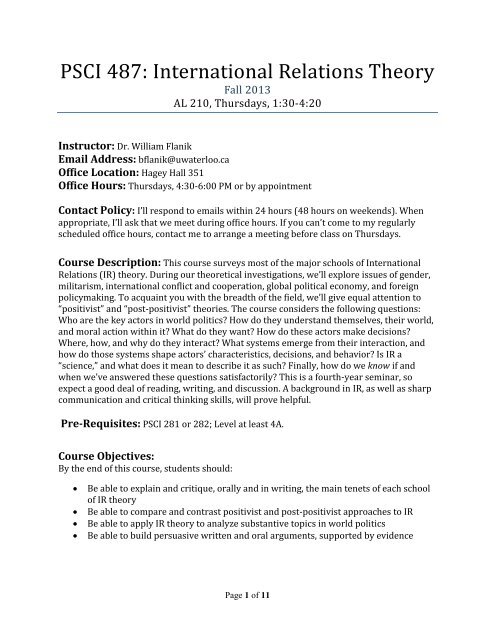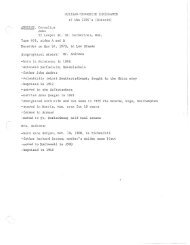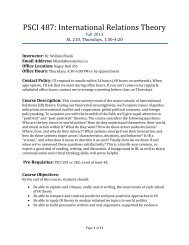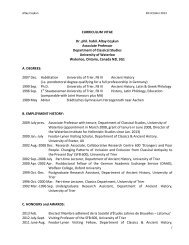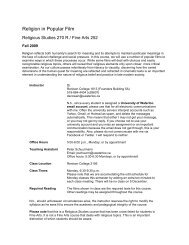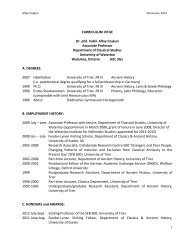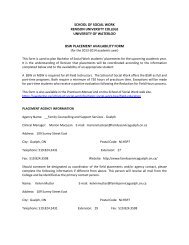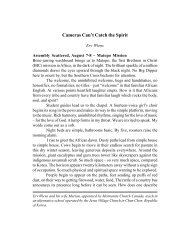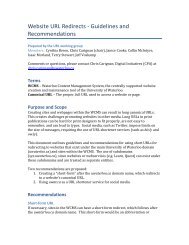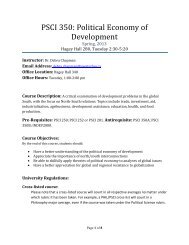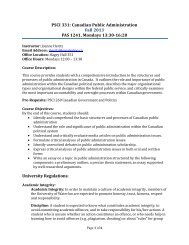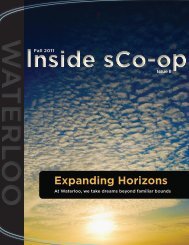PSCI 487: International Relations Theory - University of Waterloo
PSCI 487: International Relations Theory - University of Waterloo
PSCI 487: International Relations Theory - University of Waterloo
You also want an ePaper? Increase the reach of your titles
YUMPU automatically turns print PDFs into web optimized ePapers that Google loves.
<strong>PSCI</strong> <strong>487</strong>: <strong>International</strong> <strong>Relations</strong> <strong>Theory</strong><br />
Fall 2013<br />
AL 210, Thursdays, 1:30-4:20<br />
Instructor: Dr. William Flanik<br />
Email Address: bflanik@uwaterloo.ca<br />
Office Location: Hagey Hall 351<br />
Office Hours: Thursdays, 4:30-6:00 PM or by appointment<br />
Contact Policy: I’ll respond to emails within 24 hours (48 hours on weekends). When<br />
appropriate, I’ll ask that we meet during <strong>of</strong>fice hours. If you can’t come to my regularly<br />
scheduled <strong>of</strong>fice hours, contact me to arrange a meeting before class on Thursdays.<br />
Course Description: This course surveys most <strong>of</strong> the major schools <strong>of</strong> <strong>International</strong><br />
<strong>Relations</strong> (IR) theory. During our theoretical investigations, we’ll explore issues <strong>of</strong> gender,<br />
militarism, international conflict and cooperation, global political economy, and foreign<br />
policymaking. To acquaint you with the breadth <strong>of</strong> the field, we’ll give equal attention to<br />
“positivist” and “post-positivist” theories. The course considers the following questions:<br />
Who are the key actors in world politics? How do they understand themselves, their world,<br />
and moral action within it? What do they want? How do these actors make decisions?<br />
Where, how, and why do they interact? What systems emerge from their interaction, and<br />
how do those systems shape actors’ characteristics, decisions, and behavior? Is IR a<br />
“science,” and what does it mean to describe it as such? Finally, how do we know if and<br />
when we’ve answered these questions satisfactorily? This is a fourth-year seminar, so<br />
expect a good deal <strong>of</strong> reading, writing, and discussion. A background in IR, as well as sharp<br />
communication and critical thinking skills, will prove helpful.<br />
Pre-Requisites: <strong>PSCI</strong> 281 or 282; Level at least 4A.<br />
Course Objectives:<br />
By the end <strong>of</strong> this course, students should:<br />
<br />
<br />
<br />
<br />
Be able to explain and critique, orally and in writing, the main tenets <strong>of</strong> each school<br />
<strong>of</strong> IR theory<br />
Be able to compare and contrast positivist and post-positivist approaches to IR<br />
Be able to apply IR theory to analyze substantive topics in world politics<br />
Be able to build persuasive written and oral arguments, supported by evidence<br />
Page 1 <strong>of</strong> 11
Texts:<br />
All texts are available as PDF e-readings, accessible via LEARN.<br />
Course Requirements and Assessment:<br />
*** Please see course website for full details <strong>of</strong> assignments and<br />
assessment rubrics ***<br />
1) Seminar Participation: 25%<br />
Seminar courses rely on active, discussion-based learning between you and your peers. To<br />
promote high-quality discussion, I’ve allocated a full quarter <strong>of</strong> the final mark to<br />
participation.<br />
You’ll be assessed in part on your level <strong>of</strong> preparation. You are expected to come to class<br />
ready to discuss the current week’s mandatory readings (“recommended” readings are<br />
helpful but wholly optional). Good preparation requires a careful reading <strong>of</strong> the required<br />
articles or chapters—note that it may be necessary to read the texts more than once. You’re<br />
also expected to bring the week’s assigned readings to class for reference.<br />
In addition to preparation, you’ll be assessed on the regularity and persuasiveness <strong>of</strong> your<br />
comments, your contribution to a positive group dynamic (including respect for alternative<br />
points <strong>of</strong> view, turn-taking, active listening, and encouraging, referencing, and building on<br />
others’ comments), as well as your ability to critically analyze and integrate the readings<br />
into the discussion.<br />
Attendance is not itself a component <strong>of</strong> the participation mark. That said, if you don’t come<br />
to class, your participation mark will suffer: you can’t participate if you’re not there. It’s<br />
impossible to get a passing grade on this portion <strong>of</strong> your final mark by simply showing up<br />
to all classes without contributing.<br />
Please see the course website for the rubric I’ll use to assess students’ class participation.<br />
2) Research: 40%<br />
Students will write a 12-15 page research paper applying one or more IR theories to a<br />
world politics topic <strong>of</strong> their choice. You should draw on a mixture <strong>of</strong> empirical material on<br />
your chosen topic and IR theory literature from our syllabus. Use theory to identify and<br />
analyze your issue’s nature, causes, and probable outcomes, as well as the actors involved.<br />
To hone your critical thinking and writing skills, you’ll both give and receive constructive<br />
feedback on the research project.<br />
Page 2 <strong>of</strong> 11
a) Research Proposal: HARDCOPY due 26 September, in class. This is a 1-2 page<br />
document outlining your research question, provisional thesis, tentative supporting<br />
evidence, as well as the general types <strong>of</strong> theoretical and empirical literature you<br />
plan to use. The proposal isn’t marked, but I won’t grade your Revised Proposal and<br />
Annotated Bibliography until I’ve received and approved it.<br />
b) Revised Research Proposal and Annotated Bibliography: 10% HARDCOPY due 24<br />
October, in class.<br />
c) Draft for Peer Review: there is no mark, but if you don’t submit the draft, then you<br />
can’t participate in the peer review. Due Monday, 25 November, by 5:00 PM.<br />
Upload your draft to the appropriate dropbox on the course website. If you<br />
can’t upload your draft paper, then you must bring it to class in HARDCOPY on<br />
21 November. No late draft papers will be accepted.<br />
d) Peer review <strong>of</strong> a student’s paper. Not submitted or inadequate = -2% on final;<br />
adequate = neutral on final; superior = +2% on final. Two HARDCOPIES due<br />
Thursday, 28 November, in class. No late peer reviews will be accepted.<br />
e) Final Research Paper: 30% Due Friday, 6 December, by 11:59 PM. Upload your<br />
paper to the appropriate dropbox on the course website.<br />
Please see the course website for full details <strong>of</strong> the research paper, as well as the rubrics I’ll<br />
use to assess the proposal and research paper.<br />
3) Concept Memo and Briefing: 10%<br />
Each student will write a two-page memo explaining the concepts necessary for<br />
understanding that week’s readings. The student will also prepare a 10-15-minute<br />
presentation based on the memo at the beginning <strong>of</strong> that week’s class. (If you’re presenting<br />
with another student, you’ll present jointly but each submit separate memos.)<br />
Dates will be assigned the first week <strong>of</strong> class. Your memo is due at 10 AM on your<br />
assigned presentation day. Upload your memo as a .doc or .docx attachment to the<br />
appropriate section <strong>of</strong> the discussion forum named “Concept Memos and<br />
Discussion.” No late concept memos will be accepted. If you miss your presentation<br />
date without a valid excuse, you will be penalized 50% for this assignment, even if<br />
you upload your memo on time.<br />
4) Take-home Assignment: 25%<br />
I’ll distribute the take-home assignment in class on Thursday, 28 November. It’s due<br />
5 PM Friday, 29 November. Please upload the assignment to the appropriate dropbox<br />
<strong>of</strong> the course website. If your work is late, it will be penalized by 5% per hour from the<br />
time it arrives in the dropbox. I’ll grant extensions only in extenuating circumstances,<br />
which should be discussed with me in advance when possible.<br />
Page 3 <strong>of</strong> 11
Late Policy:<br />
Because these course components are time-sensitive, I will not accept late concept memos,<br />
late drafts <strong>of</strong> your paper for peer review, and late peer reviews <strong>of</strong> your colleagues’ research<br />
papers. Additionally, if you miss your concept memo briefing date, you cannot make it up.<br />
When accepted, late assignments should be uploaded as a .doc or .docx attachment to the<br />
appropriate dropbox on the course website. Late assignments are subject to a 5% per day<br />
late penalty, including weekend days (5% per hour in the case <strong>of</strong> the take-home exam).<br />
Extension Policy:<br />
If you require an extension or other accommodation, you must contact me as soon as<br />
possible. I’ll grant extensions only in extenuating circumstances, and only with proper<br />
documentation from Accessibility/Counseling Services, or with a Verification <strong>of</strong> Illness<br />
Form.<br />
Extenuating circumstances include court appearances, medical emergencies, exceptional<br />
academic demands (e.g., three other take-home exams to write in the case <strong>of</strong> the take-home<br />
exam), and accommodations for students registered with AccessAbility Services.<br />
Extenuating circumstances don’t include extra-curricular activities, travel arrangements,<br />
heavy course workloads, computer/printer/internet problems, and unfamiliarity with<br />
upload procedure for our course website. I strongly advise you to backup your work<br />
regularly, and to ensure that you have access to an internet connection and/or a working<br />
printer in advance <strong>of</strong> all deadlines.<br />
<strong>University</strong> Regulations:<br />
Academic Integrity:<br />
Academic Integrity: In order to maintain a culture <strong>of</strong> academic integrity, members <strong>of</strong><br />
the <strong>University</strong> <strong>of</strong> <strong>Waterloo</strong> are expected to promote honesty, trust, fairness, respect<br />
and responsibility.<br />
Discipline: A student is expected to know what constitutes academic integrity, to<br />
avoid committing academic <strong>of</strong>fences, and to take responsibility for his/her actions. A<br />
student who is unsure whether an action constitutes an <strong>of</strong>fence, or who needs help in<br />
learning how to avoid <strong>of</strong>fences (e.g., plagiarism, cheating) or about “rules” for group<br />
work/collaboration should seek guidance from the course pr<strong>of</strong>essor, academic<br />
advisor, or the Undergraduate Associate Dean. When misconduct has been found to<br />
have occurred, disciplinary penalties will be imposed under Policy 71 – Student<br />
Discipline. For information on categories <strong>of</strong> <strong>of</strong>fenses and types <strong>of</strong> penalties, students<br />
Page 4 <strong>of</strong> 11
should refer to Policy 71 - Student Discipline, Student Discipline<br />
http://uwaterloo.ca/secretariat/policies-procedures-guidelines/policy-71.<br />
Grievance: A student who believes that a decision affecting some aspect <strong>of</strong> his/her<br />
university life has been unfair or unreasonable may have grounds for initiating a<br />
grievance. Read Policy 70 - Student Petitions and Grievances, Section 4, Student<br />
Petitions http://uwaterloo.ca/secretariat/policies-procedures-guidelines/policy-70.<br />
In addition, consult Student Grievances http://arts.uwaterloo.ca/student-grievancesfaculty-arts-processes<br />
for the Faculty <strong>of</strong> Arts’ grievance processes.<br />
Appeals: A student may appeal the finding and/or penalty in a decision made under<br />
Policy 70 - Student Petitions and Grievances (other than regarding a petition) or<br />
Policy 71 - Student Discipline if a ground for an appeal can be established. Read Policy<br />
72 - Student Appeals, Student Appeals http://uwaterloo.ca/secretariat/policiesprocedures-guidelines/policy-72.<br />
Academic Integrity website (Arts): Academic Integrity<br />
http://arts.uwaterloo.ca/arts/ugrad/academic_responsibility.html<br />
Academic Integrity Office (u<strong>Waterloo</strong>): Academic Integrity Office<br />
http://uwaterloo.ca/academic-integrity/<br />
Accommodation for Students with Disabilities:<br />
Note for students with disabilities: The AccessAbility Services (AS) Office, located<br />
in Needles Hall, Room 1132, collaborates with all academic departments to arrange<br />
appropriate accommodations for students with disabilities without compromising the<br />
academic integrity <strong>of</strong> the curriculum. If you require academic accommodations to<br />
lessen the impact <strong>of</strong> your disability, please register with the AS Office at the beginning<br />
<strong>of</strong> each academic term.<br />
Weekly Schedule:<br />
12 September: Welcome and Course Overview<br />
Students will sign up for concept memo/presentation days.<br />
Everyone reads:<br />
19 September: History, Historiography, and Practice <strong>of</strong> IR<br />
Brian C. Schmidt. 2012. On the History and Historiography <strong>of</strong> <strong>International</strong> <strong>Relations</strong>. In<br />
Handbook <strong>of</strong> <strong>International</strong> <strong>Relations</strong>, 2d ed., 2-28. Edited by Walter Carlsnaes, Thomas<br />
Risse, and Beth Simmons. London: Sage.<br />
David A. Lake. 2011. Why ‘Isms’ Are Evil: <strong>Theory</strong>, Epistemology, and Academic Sects as<br />
Impediments to Understanding and Progress. <strong>International</strong> Studies Quarterly 55:465-480.<br />
Page 5 <strong>of</strong> 11
Stephen M. Walt. 2005. The <strong>Relations</strong>hip between <strong>Theory</strong> and Policy in <strong>International</strong><br />
<strong>Relations</strong>. Annual Review <strong>of</strong> Political Science 8:23-48.<br />
Steve Smith. 2004. Signing Our World into Existence: <strong>International</strong> <strong>Relations</strong> <strong>Theory</strong> and<br />
September 11. <strong>International</strong> Studies Quarterly 48:499-515.<br />
I highly recommend that students skim the following:<br />
Daniel Maliniak, Amy Oakes, Susan Peterson, and Michael J. Tierney. 2011. <strong>International</strong> <strong>Relations</strong><br />
in the US Academy. <strong>International</strong> Studies Quarterly 55:437-464.<br />
Everyone reads:<br />
26 September: Metatheoretical Debates<br />
Milka Kurki and Colin Wight. 2013. <strong>International</strong> <strong>Relations</strong> and Social Science. In<br />
<strong>International</strong> <strong>Relations</strong> Theories: Discipline and Diversity, 14-35. Edited by Tim Dunne, Milja<br />
Kurki, and Steve Smith. Oxford <strong>University</strong> Press.<br />
Alexander Wendt. 1998. On Constitution and Causation in <strong>International</strong> <strong>Relations</strong>. Review<br />
<strong>of</strong> <strong>International</strong> Studies 4 (5):101-118.<br />
Steven Bernstein, Richard Ned Lebow, Janice Gross Stein, and Steven Weber. 2000. God<br />
Gave Physics the Easy Problems: Adapting Social Science to an Unpredictable World.<br />
European Journal <strong>of</strong> <strong>International</strong> <strong>Relations</strong> 6 (1):43-76.<br />
Read one <strong>of</strong>:<br />
David Dessler. 1989. What’s at Stake in the Agent-Structure Debate? In <strong>International</strong><br />
Organization: A Reader, 328-341. Edited by Friedrich Kratochwil and Edward D. Mansfield.<br />
New York: HarperCollins.<br />
or<br />
Alexander Wendt. 1987. The Agent-Structure Problem in <strong>International</strong> <strong>Relations</strong> <strong>Theory</strong>.<br />
<strong>International</strong> Organization 41 (3):335-370.<br />
Recommended for a general overview <strong>of</strong> causation:<br />
Peter Hedström. 2009. Dissecting the Social. In Theories <strong>of</strong> Social Order: A Reader, 2d ed. 13-<br />
16. Princeton, N.J.: Stanford <strong>University</strong> Press.<br />
Thomas F. Homer-Dixon. 1998. Appendix: The Causal Role <strong>of</strong> Environmental Scarcity. In<br />
Environment, Scarcity, and Violence, 105-106. Princeton <strong>University</strong> Press.<br />
Page 6 <strong>of</strong> 11
Recommended for a more in-depth introduction to meta-theory:<br />
Colin Wight. 2002. Philosophy <strong>of</strong> Social Science and <strong>International</strong> <strong>Relations</strong>. In Handbook <strong>of</strong><br />
<strong>International</strong> <strong>Relations</strong>, 23-51. Edited by Walter Carlsnaes, Thomas Risse, and Beth<br />
Simmons. London: Sage.<br />
HARDCOPY <strong>of</strong> Research Proposal due in class.<br />
3 October: Normative <strong>Theory</strong><br />
Everyone reads:<br />
Toni Erskine. 2013. Normative <strong>International</strong> <strong>Relations</strong> <strong>Theory</strong>. In <strong>International</strong> <strong>Relations</strong><br />
Theories: Discipline and Diversity, 36-58. Edited by Tim Dunne, Milja Kurki, and Steve Smith.<br />
Oxford <strong>University</strong> Press.<br />
Debra Satz. 2005. What Do We Owe The Global Poor? Ethics & <strong>International</strong> Affairs 19<br />
(1):47-55.<br />
Hedley Bull. 1966. The Grotian Concept <strong>of</strong> <strong>International</strong> Society. In Diplomatic<br />
Investigations: Essays in the <strong>Theory</strong> <strong>of</strong> <strong>International</strong> Politics, 51-73. Edited by Herbert<br />
Butterfield and Martin Wight. London: George Allen & Unwin.<br />
David C. Hendrickson. 1997. In Defense <strong>of</strong> Realism: A Commentary on Just and Unjust Wars.<br />
Ethics & <strong>International</strong> Affairs 11:19-53.<br />
10 October: Classical Realism and Classical Liberalism<br />
Everyone reads:<br />
Richard Ned Lebow. 2012. Classical Realism. In <strong>International</strong> <strong>Relations</strong> Theories: Discipline<br />
and Diversity, 59-76. Edited by Tim Dunne, Milja Kurki, and Steve Smith. Oxford <strong>University</strong><br />
Press.<br />
David A. Welch. 2003. Why <strong>International</strong> <strong>Relations</strong> Theorists Should Stop Reading<br />
Thucydides. Review <strong>of</strong> <strong>International</strong> Studies 29:301-319.<br />
Bruce Russett. 2013. Liberalism. In <strong>International</strong> <strong>Relations</strong> Theories: Discipline and<br />
Diversity, 94-113. Edited by Tim Dunne, Milja Kurki, and Steve Smith. Oxford <strong>University</strong><br />
Press.<br />
Page 7 <strong>of</strong> 11
Stanley H<strong>of</strong>fmann. 1968. “The Uses and Limits <strong>of</strong> <strong>International</strong> Law.” [Note: This brief essay<br />
is from <strong>International</strong> Politics: Enduring Concepts and Contemporary Issues. 1992. Robert J.<br />
Art and Robert Jervis, eds. New York: HarperCollins.]<br />
G. John Ikenberry and Charles A. Kupchan. 2004. Liberal Realism: The Foundations <strong>of</strong> a<br />
Democratic Foreign Policy. The National Interest (Fall 2004):38-49.<br />
Everyone reads:<br />
17 October: The “Neo-Neo Debate”<br />
Robert Jervis, “Offense, Defense and the Security Dilemma; “Stephen M. Walt, “Alliances:<br />
Balancing and Bandwagoning;”and Kenneth N. Waltz, “The Anarchic Structure <strong>of</strong> World<br />
Politics.” [Note: These brief essays are from <strong>International</strong> Politics: Enduring Concepts and<br />
Contemporary Issues. 1992. Robert J. Art and Robert Jervis, eds. New York: HarperCollins.]<br />
John J. Mearsheimer. 2013. Structural Realism. In <strong>International</strong> <strong>Relations</strong> Theories:<br />
Discipline and Diversity, 77-93. Edited by Tim Dunne, Milja Kurki, and Steve Smith. Oxford<br />
<strong>University</strong> Press.<br />
Robert O. Keohane. 1984. “A Functional <strong>Theory</strong> <strong>of</strong> Regimes.” [In <strong>International</strong> Politics:<br />
Enduring Concepts and Contemporary Issues. 1992. Robert J. Art and Robert Jervis, eds. New<br />
York: HarperCollins.]<br />
Robert Powell. 1994. Anarchy in <strong>International</strong> <strong>Relations</strong> <strong>Theory</strong>: The Neorealist-Neoliberal<br />
Debate. <strong>International</strong> Organization 48 (2):313-344.<br />
Everyone reads:<br />
24 October: Rational Choice<br />
Robert Axelrod. 1984. The Evolution <strong>of</strong> Cooperation. In Theories <strong>of</strong> Social Order: A Reader,<br />
2d ed., 175-185. Edited by Michael Hechter and Christine Horne. Stanford, Calif.: Stanford<br />
Social Sciences.<br />
Martin Hollis and Steve Smith. 1990. Games Nations Play (I). In Explaining and<br />
Understanding <strong>International</strong> <strong>Relations</strong>, 118-142. Oxford <strong>University</strong> Press.<br />
Christopher H. Achen and Duncan Snidal. 1989. Rational Deterrence <strong>Theory</strong> and<br />
Comparative Case Studies. World Politics 41 (2):143-169.<br />
Richard Ned Lebow and Janice Gross Stein. 1989. Rational Deterrence <strong>Theory</strong>: I Think,<br />
Therefore I Deter. World Politics 41 (2):208-224.<br />
Page 8 <strong>of</strong> 11
Recommended for a basic introduction to rational choice:<br />
Michael Nicholson. 1992. Rationality and Conflict. In Rationality and the Analysis <strong>of</strong><br />
<strong>International</strong> Conflict, 45-62. Cambridge: Cambridge <strong>University</strong> Press.<br />
HARDCOPY <strong>of</strong> Revised Research Proposal and Annotated Bibliography due in class.<br />
Everyone reads:<br />
31 October: Psychology, Decisionmaking, and Collective Behavior<br />
Janis G. Stein. 2012. Psychological Explanations <strong>of</strong> <strong>International</strong> Decisionmaking and<br />
Collective Behavior. In Handbook <strong>of</strong> <strong>International</strong> <strong>Relations</strong>, 2d ed., 195-219. Edited by<br />
Walter Carlsnaes, Thomas Risse, and Beth Simmons. London: Sage.<br />
Jack S. Levy. 2000. Loss Aversion, Framing Effects, and <strong>International</strong> Conflict: Perspectives<br />
from Prospect <strong>Theory</strong>. In Handbook <strong>of</strong> War Studies II, 193-221. Ann Arbor: <strong>University</strong> <strong>of</strong><br />
Michigan Press.<br />
Jonathan Mercer. 2010. Emotional Belief. <strong>International</strong> Organization 64 (1):1-31.<br />
James D. Fearon and David D. Laitin. 2000. Violence and the Social Construction <strong>of</strong> Ethnic<br />
Identity. <strong>International</strong> Organization 54 (4):845-877.<br />
Everyone reads:<br />
7 November: Constructivism<br />
Emannuel Adler. 1997. Seizing the Middle Ground: Constructivism in World Politics.<br />
European Journal <strong>of</strong> <strong>International</strong> <strong>Relations</strong> 3 (3)-319-363.<br />
Alexander Wendt. 1992. Anarchy is What States Make <strong>of</strong> It: The Social Construction <strong>of</strong><br />
Power Politics. In <strong>International</strong> Organization: A Reader, 77-94. Edited by Friedrich<br />
Kratochwil and Edward D. Mansfield. New York: Harper Collins.<br />
Martha Finnemore and Kathryn Sikkink. 1998. <strong>International</strong> Norm Dynamics and Political<br />
Change. <strong>International</strong> Organization 52:887-918.<br />
Peter Howard. 2004. Why Not Invade North Korea? Threats, Language Games, and U.S.<br />
Foreign Policy. <strong>International</strong> Studies Quarterly 48:805-828.<br />
14 November: Marxism and Critical <strong>Theory</strong><br />
Page 9 <strong>of</strong> 11
Everyone reads:<br />
Mark Rupert. 2013. Marxism. In <strong>International</strong> <strong>Relations</strong> Theories: Discipline and Diversity,<br />
153-170. Edited by Tim Dunne, Milja Kurki, and Steve Smith. Oxford <strong>University</strong> Press.<br />
Robert W. Cox. 1981. Social Forces, States, and World Orders: Beyond <strong>International</strong><br />
<strong>Relations</strong> <strong>Theory</strong>. In <strong>International</strong> Organization: A Reader, 343-364. Edited by Friedrich<br />
Kratochwil and Edward D. Mansfield. New York: Harper Collins.<br />
Stephen Gill. 1995. Globalization, Market Civilization, and Disciplinary Neoliberalism.<br />
Millennium 24 (3):399-423.<br />
Ray Kiely. 2006. United States Hegemony and Globalization : What Role for Theories <strong>of</strong><br />
Imperialism? Cambridge Review <strong>of</strong> <strong>International</strong> Affairs 19 (2):205-221.<br />
Everyone reads:<br />
21 November: Feminism, Gender Studies, and Postcolonialism<br />
J. Ann Tickner and Laura Sjoberg. 2013. Feminism. In <strong>International</strong> <strong>Relations</strong> Theories:<br />
Discipline and Diversity, 205-222. Edited by Tim Dunne, Milja Kurki, and Steve Smith.<br />
Oxford <strong>University</strong> Press.<br />
J. Ann Tickner. 1997. You Just Don’t Understand: Troubled Engagements between<br />
Feminists and IR Theorists. <strong>International</strong> Studies Quarterly 41:611-632.<br />
R. Charli Carpenter. 2002. Gender <strong>Theory</strong> in World Politics : Contributions <strong>of</strong> a Nonfeminist<br />
Standpoint? <strong>International</strong> Studies Review 4 (3):153-165.<br />
Siba N. Grovogui. 2013. Postcolonialism. In <strong>International</strong> <strong>Relations</strong> Theories: Discipline and<br />
Diversity, 247-265. Edited by Tim Dunne, Milja Kurki, and Steve Smith. Oxford <strong>University</strong><br />
Press.<br />
Julie Bindel. 2013. Meet the Middle-aged Women who are Britain’s Female Sex Tourists.<br />
New Statesman. 29 August. Available at<br />
. Accessed 9<br />
September 2013.<br />
HARDCOPY <strong>of</strong> Draft Research Paper Due (if you cannot upload it on 25 November)<br />
Everyone reads:<br />
28 November: Poststructuralism and Discursive Approaches<br />
Page 10 <strong>of</strong> 11
Lene Hansen. 2006. Discourse Analysis, Identity, and Foreign Policy. In Security as Practice:<br />
Discourse Analysis and the Bosnian War, 35-52. London: Routledge.<br />
Yoshiko M. Herrera and Bear F. Braumoeller. 2004. Symposium: Discourse and Content<br />
Analysis. Qualitative Methods 2 (1):15-39. [Read only contributions by Hardy, Harley, and<br />
Phillips; Laffey and Weldes; Hopf; and Fierke.]<br />
Jennifer Milliken. 1999. The Study <strong>of</strong> Discourse in <strong>International</strong> <strong>Relations</strong>: A Critique <strong>of</strong><br />
Research and Methods. European Journal <strong>of</strong> <strong>International</strong> <strong>Relations</strong> 5:225-254.<br />
Carol Cohn. 1986. Sex and Death in the Rational World <strong>of</strong> Defense Intellectuals. Signs 12<br />
(4):687-718.<br />
TWO HARDCOPIES <strong>of</strong> peer review due in class.<br />
Page 11 <strong>of</strong> 11


